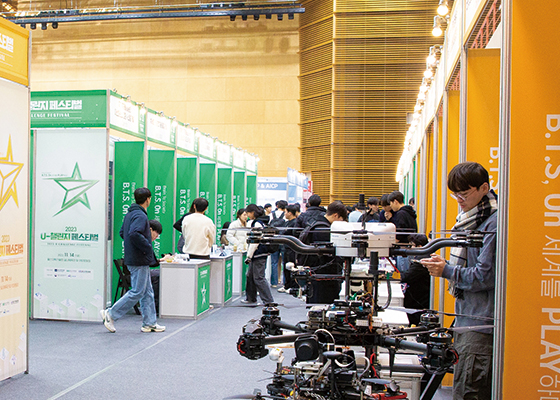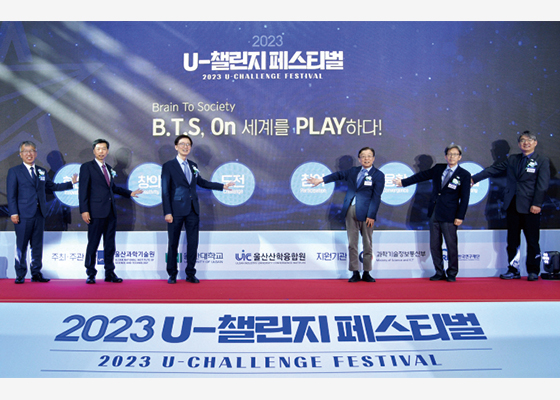
- Now, Unist
- 2023 WINTER
UNIST NEWS
본문영역
2023 WINTER
UNIST NEWS
01
UNIST Signs MoU with NREL from the US to Advance Carbon-Neutral Technology
UNIST is making efforts to secure “First Mover DNA” in all fields — including, but not limited to research, education, and international cooperation — with a vision to be ranked among the world’s top-100 research-oriented universities by 2027. UNIST President Yong Hoon Lee visited the National Renewable Energy Laboratory (NREL) in Denver, Colorado in the United States on October 31 to sign a Memorandum of Understanding (MoU) for promoting collaboration and joint-research in the field of carbon neutrality. NREL is a institute under the U.S. Department of Energy that leads research and development of next-generation energy with the highest authority. The agreement will facilitate the two institutions’ cooperation in several fields including renewable carbon technology and solar cells.
UNIST will, in particular, promote research personnel exchange and joint technology development programs. The detailed scope of collaboration includes, but is not limited to development of technologies for replacement of fossil fuel-based plastics, reduction of waste plastics, and large-area modulization of next generation solar cells. Preparations are also underway for the joint hosting of international academic conferences in related fields, and the establishment of an international consortium.
UNIST also signed an exchange agreement with the University of Texas at Austin, a prestigious university that ranks 58th in the QS World University Rankings and 52nd in THE Ranking, on November 1 to effectively facilitate student and researcher exchange programs.
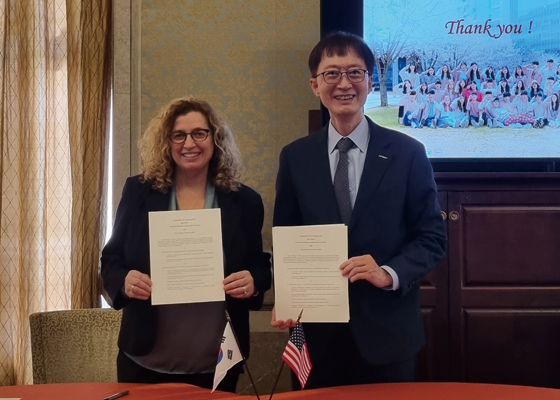
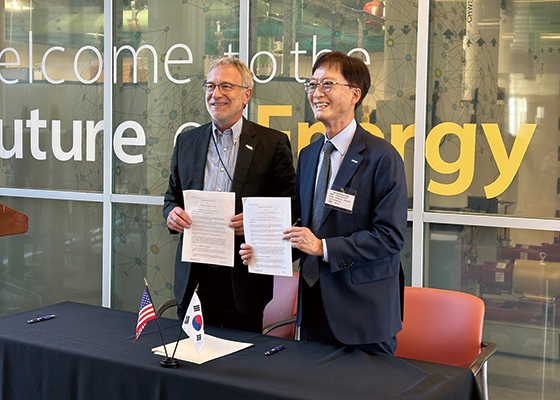
02
UNIST Signs a Strategic Partnership with ADNOC, Opening a New AI-Driven Era of Carbon Neutrality!
UNIST is making forward strides to lead the market for global digital carbon neutrality by forging a strategic partnership with the Abu Dhabi National Oil Company (ADNOC), the largest state-owned oil company in the United Arab Emirates (UAE). The purpose of the strategic partnership is to lead the market of global carbon-neutrality through joint development of a decarbonized optimization system for large-scale oil-refining and petrochemical processes based on AI technology. The Strategic Collaboration Agreement (SCA) was signed between UNIST and ADNOC at the Abu Dhabi Energy Center in the UAE on May 10, 2023 for leading the global digital carbon-neutral market.
Pursuant to the agreement, the two institutions agreed to initiate two projects to lead digital carbon-neutrality from the second half of this year, and launch a digital carbon neutrality joint research center by the end of the year, if possible. The two projects include “development of AI technology for the optimization of continuous multi-step process of liquid chemicals used in oil and petrochemical plants,” as well as “development of an environmental monitoring system that utilizes AI technology and satellite images.” When the joint research center is launched, the two institutions plan on promoting the following three tasks: “Development of AI-based optimized oil refining processes,” “Development of decarbonized and sustainable oil refining processes,” and “Creation of an eco-friendly hydrogen industry model.” Furthermore, the two organizations agreed to actively cooperate in establishing a “digital carbon-neutral strategic partnership” at the national level, in close collaboration with the central and local governments of the two countries, research institutes, and private companies.
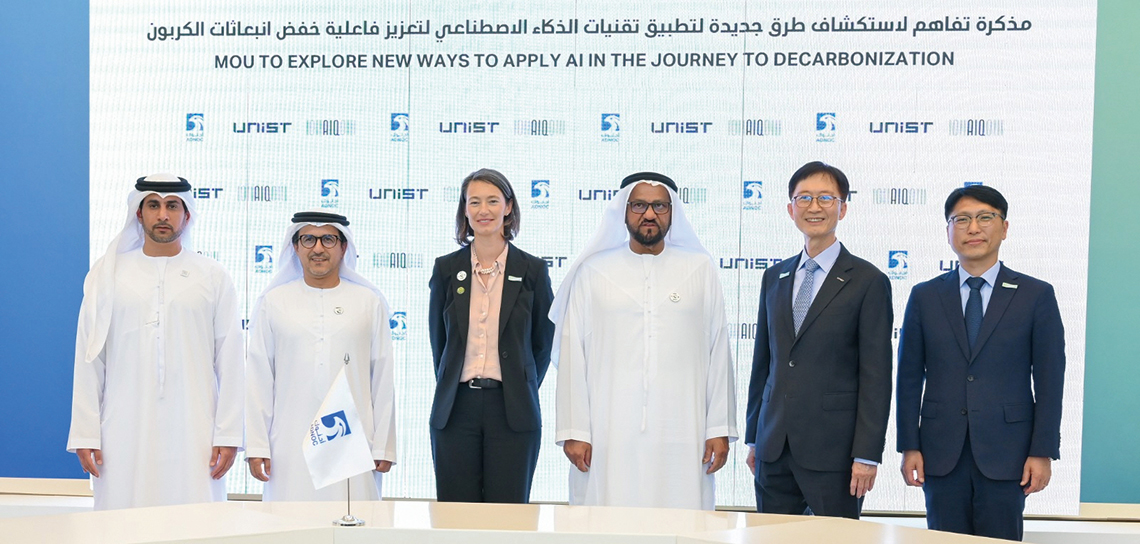
03
UNIST Selected for Semiconductor Specialization Graduate School Support Project as One of the Top 3!
UNIST has been selected for the Semiconductor Specialization Graduate School Support Project by the Ministry of Trade, Industry, and Energy (MOTIE). An official announcement was made by MOTIE on May 26 that UNIST was chosen for the Semiconductor Specialization Graduate School Support Project, along with KAIST and Sungkyunkwan University. Each university will receive a substantial amount of support worth 15 billion KRW over the next five years until 2028. Professor Tae-Sik Yoon, Dean of the UNIST Graduate School of Semiconductor Materials and Devices Engineering said, “Being selected for this project following the establishment of Samsung Semiconductor’s contract department in March demonstrates that UNIST has been recognized as one of the top-three universities in the field of semiconductor research capability in Korea.” He added that UNIST is now prepared to nurture key semiconductor talents regularly, from undergraduates to graduate students.
In particular, this selection helps expedite the Digital New Deal project that UNIST is leading in the southeast region. UNIST has been promoting the Digital New Deal since 2021 by establishing a graduate school of semiconductor materials and parts — with an aim to cultivate small, medium, and long-term companies in the fine chemicals industry.
As a member of the project, the UNIST Graduate School of Semiconductor Materials and Devices Engineering will be selecting 65 graduate students each year, and continuing to hire full-time teachers to promote the graduate school’s research capabilities. The curriculum is designed to be based on practical education and self-directed problem-solving skills. The objective is to nurture the talents who have attitudes of inquiry based on facts, and can solve various research issues that companies facing.
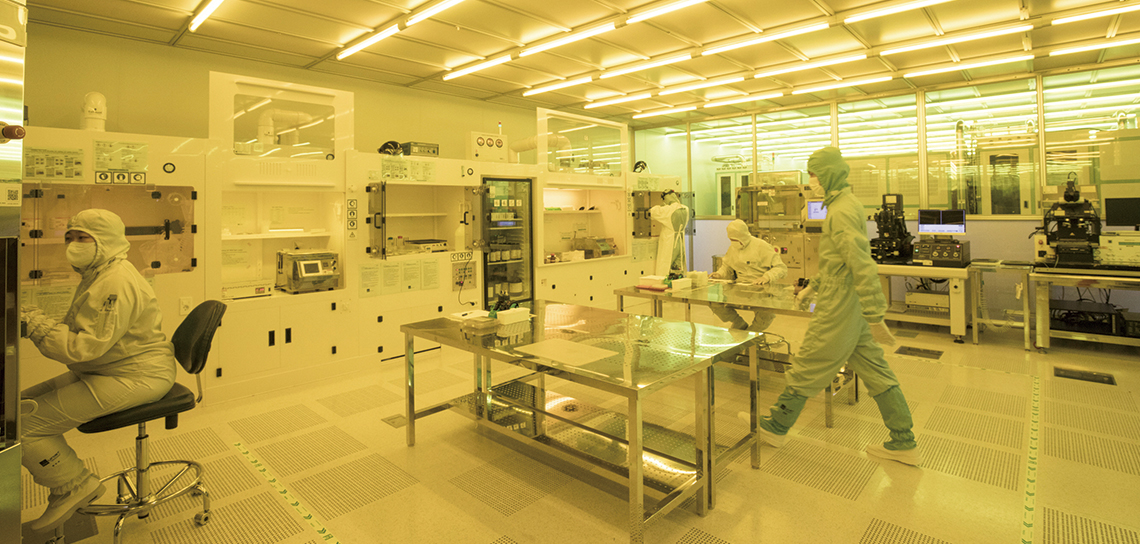
04
Successful Hosting of the 3rd U-Challenge Festival! Making Advances as the Local Science Festival!
The university student research club’s presentation on research achievements is evolving into a science festival in the region. The “2023 U-Challenge Festival” took place at UNIST on November 14. The U-Challenge Festival, now in its third year, showcases the research achievements of student clubs such as the BTS (Brain to Society) research team who do research on the practical issues. The event this time raised its presence as a local science festival with various activities involving high school students in Ulsan, and students from HyeJinWon, a local social welfare facility.
The festival also presented awards for project teams showing outstanding achievements. The winning team of the BTS research project was selected based on the combination of the pre-assessment results and on-site assessment conducted on the day of the festival. The grand prize was awarded to “ABLY” from UNIST, a research team that showcased resource recovery technology that creates natural gas by decomposing semiconductor wastewater substances using microorganisms; and “COTN” from the University of Ulsan, which produced successful results with the technology that recovers and recycles raw materials from water used to wash the cathode in secondary batteries.
The indoor gym showcased the research achievements of UNIST’s student research club cultivation projects, including the AI Challenger Program (AICP) and the Undergraduate Interdisciplinary Research Project (UIRP). The festival displayed the achievements of students as a result of supporting them to voluntarily research and explore various research themes, including AI and multidisciplinary studies for the past year. A total of 211 students and 55 groups have participated in these projects.
